All About National Taiwan University 國立臺灣大學, Taipei
Dr. Jer-Ming Hu 胡哲明 Deputy Dean of International Affairs
Associate Professor, Institute of Ecology & Evolutionary Biology
Opportunities & Innovation for Overseas Students
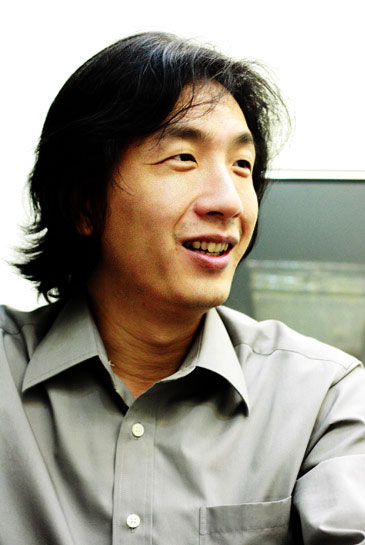
Deputy Dean of International Affairs
Associate Professor, Institute of Ecology & Evolutionary Biology
Dr. Jer-Ming Hu, Deputy Dean of NTU's Office of International Affairs and Associate Professor at the Institute of Ecology & Evolutionary Biology says the goals of international students studying at NTU are diverse, arising from the wide array of countries students come from. Still, Dr. Hu says trends are noticeable. Many students from Europe and North America focus on learning Chinese and studying management. Such students focus on China and creating a network base from Taiwan.
Many students from South-east Asia, Central and South America focus on technology and management studies, planning to return to their countries. For them, choosing Taiwan arises from a variety of reasons: distance - Taiwan can be closer to home - or the generous opportunities Taiwan, and especially NTU, offers. Plus, in the case of NTU, the country's pre-eminent research and scholarship.
According to Dr. Hu the focused motivation - that international students know why they are on campus and what they want to do - often means international students find life at NTU easy. The campus' location in the heart of metropolitan Taipei also adds to an comfortable studying environment.
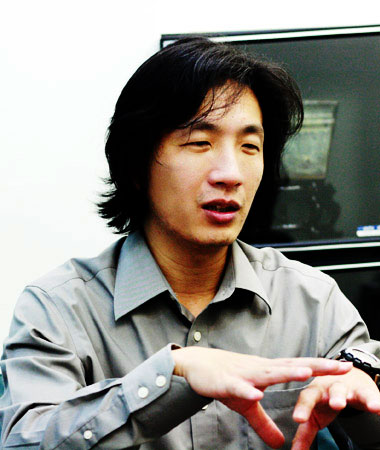
Deputy Dean of International Affairs
Associate Professor, Institute of Ecology & Evolutionary Biology
Dr. Hu further noted that National Taiwan University is distinct from many of the campuses in Taiwan in that it is much more research and scholarship-oriented, with numerous graduates going on to carry out the county's most cutting edge scholarly inquiries. NTU's elite designation also translates into opportunity for international students in that one finds the local students at NTU are often the highest achievers in the country. This means that CEOs, industry and political leaders of Taiwan are often found to be graduates of NTU - alumni who support the campus with internships and opportunities offered to newest graduates. International students taking advanced degrees at NTU become those newest graduates.
Visiting Students Program
Dr. Hu indicated that he was interested in what makes students undertake a full 2-year, 3-year (or longer) degree program overseas and described the Visiting Students program as a newly-opened study option that heretofore in Taiwan had been missing and which may increase the number of students who come to Taiwan to study.
The Visiting Students program allows international students to take classes from any college or department for short-term study. With Spring 2009 the program has been opened at NTU. The Visiting Students enrollment allows international students to take specific courses they may be interested in - Chinese Philosophy, International Relations, General Biology, etc.- whereas before such study would require only be possible as part of a degree program.
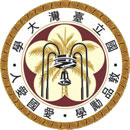
國立臺灣大學校徽
NTU's Visiting Student Program is patterned after the EU's ERASMUS (European Action for the Social Mobility of University Students) program, where students choose to study at 3 member countries' elite universities within 2 years for credit at their own schools. The philosophy behind the ERASMUS program is that students can begin to appreciate different EU cultures by having the opportunity to experience them 1st-hand.
Dr. Hu also extolled NTU's long-established tradition of welcoming international students & scholars. He described the broad English-Chinese environment found across the campus and the way NTU supports Chinese study for all international students. Combining these traditions with the newly opened Visiting Students program, Dr. Hu sees a new and exciting chapter of NTU's history opening offering and an array of opportunities opening for international students at NTU.
Dr. Wim De Reu 魏家豪, Assistant Professor at Department of Philosophy
From Student to Professor
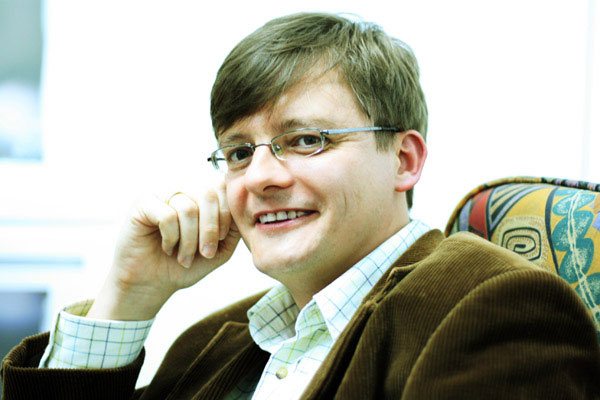
Dr. De Reu received his undergraduate degree in Sinology at Katholieke Universiteit Leuven, Belgium, where became deeply interested in Chinese philosophy. As Dr. De Reu’s undergraduate degree was concluding he consulted Katholieke Universiteit’s Sinology department director Dr. Nicolas Standaert鐘鳴旦 for his suggestion about where to do postgraduate study in Chinese philosophy. Dr. Standaert, one of the world’s leading Sinologists focusing on the interpretation of Western and Chinese culture, strongly encouraged the then student De Reu to pursue advance his studies at National Taiwan University. Dr. De Reu applied for the Master’s degree program and applied for a scholarship as well. Both applications were favorably received!
Arriving in 1996 Dr. De Reu chose to take just 2 classes in Chinese philosophy thinking that, even though he was confident in his Chinese ability from his undergraduate studies in Belgium, it was largely academic – perhaps better to ease into the application of his studies in a true all-Chinese classroom environment.
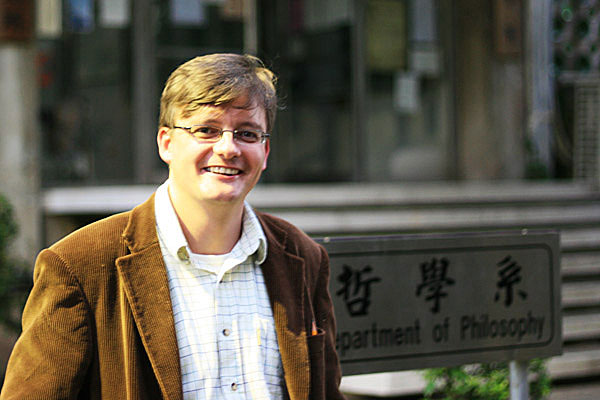
Indeed, he found the first semester challenging, being asked to read classical Chinese extensively. This was not the only challenge: in Belgium, Dr. De Reu was taught simplified Chinese characters. Arriving in Taiwan he needed to spend time to acquaint himself with traditional Chinese. characters. To Dr. De Reu, though, this was not as big of as challenge as handling the profundity of the subject matter, and handling in-classroom listening skills – particularly the speed at which native Chinese speakers spoke.
Dr. De Reu undergraduate days were spent living in Leuven, Belgium - a university city. Arriving at the NTU found Dr. De Reu found a vast campus in the center of the city, but still in a way set off from the city. Having finished 4 years of campus life in Belgium, and with a desire to be more immersed in the broader environment, Dr. De Reu took off campus housing for his graduate studies.
Dr. De Reu considers Taiwan as one of the most vital places to study Chinese – since students have direct access to the sources of even the most ancient texts. Despite some advantages in methodology and perhaps newer interpretations, for Dr. De Reu scholarship in the West cannot match the advantage of direct access to primary sources that is found in Taiwan. Dr. De Reu related how during his Master’s & Ph.D. studies at NTU students would not only read articles, but also be able to get to the various strains and influences that lead to various paradigms – to be able to reveal the entire skein of a philosophy’s development through their immediate access to the most ancient texts.
Furthermore, Dr. De Reu noted the way in which students and professors in his program are so deeply familiar with the materials. Dr. De Reu feels that studying with and learning from scholars who know Chinese philosophy as a matter of cultural inheritance provides the western scholar with an unprecedented advantage and insight.
Dr. De Reu was awarded his Ph.D. in 2004, and began teaching at National Taiwan University in August, 2005. He considered posts in Singapore, America and Taiwan as well. He admits that there were many strong offers and influences drawing him in different directions. An opportunity to do post. doc. at Harvard University, and offers from China.
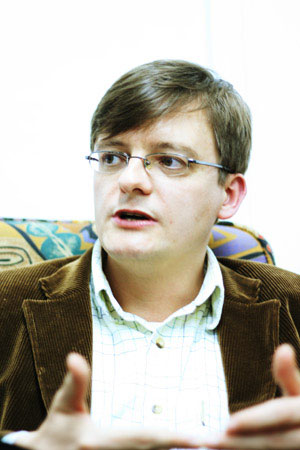
Assistant Professor at Department of Philosophy
Still, Dr. De Reu returns to the issue of primary sources. Noting that in Europe or America access to original material is curtailed and that many departments focus on Modern Sinology, politics or economics. Further, with the usually small size of Chinese philosophy departments in the West and the way that, absented from primary texts, students and scholars can often find it challenging to achieve sufficient depth – considering these factors for Dr. De Reu NTU becomes the most advantageous environment for studying Chinese Philosophy.
In addition to the manifest academic opportunities Dr. De Reu pointed out how welcoming he finds Taiwan for overseas visitors and students. He recounted the numerous times he’s been invited to the homes of local folks during holidays. Further, Dr. De Reu mentioned that he has always felt that Taiwan is a very safe environment, where even late at night a walk on the streets is not accompanied by the sense of danger one might have in any other capital city around the world.
Regarding the issue of being a teacher of Chinese Philosophy when he himself is not Chinese, Dr. De Reu noted that he has in the past been challenged in his classroom on this very point, though local students soon come to realize the depth of scholarship Dr. De Reu brings to classes. Dr. De Reu mentioned that one of the advantages he brings to the study of Chinese philosophy is a thoroughgoing immersion in the classic texts combined with his grounding in Western cultural and research traditions. Unique in his field Dr. De Reu’s singularity was one of the very reasons that led NTU to hire him. Still, Dr. De Reu points out that more and more Westerners are achieving just the same credentials, and expanding the corpus and understanding of Chinese Philosophy.
Addressing the issue of teaching style Dr. De Reu pointed out that it was his desire to encourage students to approach the material, and even his own classes, critically. Though he finds local students somewhat reticent to confront teachers in class, he has found this to be changing over time. Overall, Dr. De Reu finds NTU student to be of very high caliber.
To the idea of studying abroad, Dr. De Reu spoke at length of the way in which students gain key advantages through the experience. Seeing how other societies, though they may approach things in a totally different fashion, function no the less well -- seeing and experiencing this by studying and living overseas for an extended period of time broadens students understanding not just of the other cultures, but of their own culture and even themselves.
Dr. De Reu traces his initial interest in Sinology back to a UNESCO publication he happened upon as a youth. Recalling how he told his father, and elementary school principal, and mother, who worked for Shell Petroleum, Brunei, that his original interest in the law had changed to Sinology.
Dr. Vivek Walia & Family
Visiting Specialist to Resident, Wife Now Studying for Ph.D at NTU
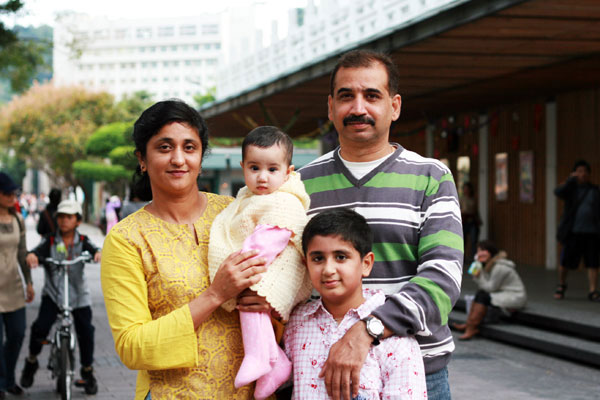
Dr. Vivek Walia is from Amritsar, Punjab, India. He married 10/10/1999 and earned his Ph.D. in Physics from the Gur Nanak Dev University in 2001, with a specialization in Earthquake Precursor Studies. At that time he began working for his university. Under these auspices he attended the Nuclear Tracks in Solids conference in New Delhi to present a paper on Himalaya Mountain Earthquake Precursor Studies . At that same conference NTU’s Dr. Tsanyao Yang was also presenting a paper on Earthquake Precursor Studies focusing on the mountains of Taiwan. Dr. Yang strongly encouraged Walia to consider Taiwan & NTU, perhaps just for a brief period of research.
Arriving at NTU in 2003 as a Visiting Specialist in the Geosciences Department, Walia’s short-term of research has turned into long-term residence in Taiwan. Today Walia and his wife Monika are raising their family in Taipei. For Dr. Walia Taiwan is "Just like a second home".
Dr. Walia’s research at NTU began in June 2003. Dr. Walia’s wife Monika joined him after 3 months, arriving with her son. Monika Walia is from Chandigarh, Punjab, India. She holds a Master’s Degree in Geology from the Punjab University, Chandigarh. Today, Monika is pursuing her Ph.D. in Geosciences at NTU and raising her family here. For Monika the strong English of faculty makes pursuing her Ph.D. at NTU an enjoyable and efficient experience. Monika mentioned that these strong English abilities are found across the campus, making NTU a terrific environment for an overseas student.
Perhaps no stronger endorsement of Taiwan can come from the fact that Monika’s second child, the lovely daughter-Maanya was born here.
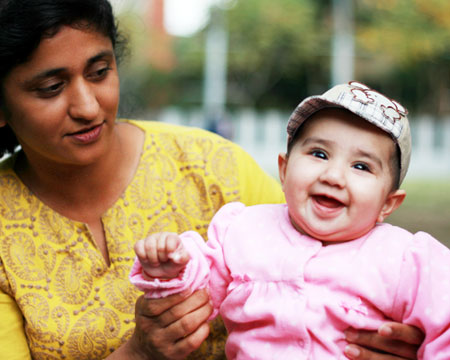
Today, Monika continues her Ph.D. studies at NTU under the guidance of Prof Tsanyao Yang. Dr. Walia works for the National Center for Research on Earthquake Engineering. Another example of how strong NTU’s reputation - the NCREE’s research lab is on the campus of NTU.
The Walia’s son Prateek, whose name means ‘Symbol’ in Hindi, arrived in Taiwan at the age of 2 years and 9 months. Today he is studying in Xiu-Xan Elementary School in Taipei County. His favorite classes are Chinese & Physics. Prateek says he likes Taiwan and has found it easy to make many friends here. These days Prateek finds himself sometimes as English tutor to his classmates. Prateek likes to follow and play cricket. Each Sunday morning Dr. Walia & his son join about 15 others on the campus of NTU to play cricket. Prateek is also fond of car racing and the Taipei 101.
Maanya Walia, whose name means ‘Accepted Respectfully‘ in Hindi, was born in Taipei at the Ko Ze Shian Obstetrics Hospital in June 2008. She is the lovely & cute latest addition to the Walia family in Taiwan.




